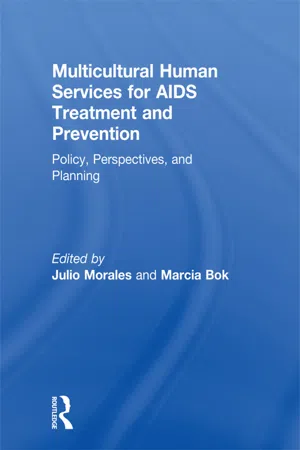
Multicultural Human Services for AIDS Treatment and Prevention
Policy, Perspectives, and Planning
- 130 pages
- English
- ePUB (mobile friendly)
- Available on iOS & Android
Multicultural Human Services for AIDS Treatment and Prevention
Policy, Perspectives, and Planning
About this book
This much-needed book presents an introduction and overview of multicultural AIDS issues in social work practice. In a culturally diverse nation, it is essential that professionals look at AIDS within a cultural context in order to find the most effective treatment and prevention strategies for everyone. Emphasizing this need for a culturally sensitive approach, Multicultural Human Services for AIDS Treatment and Prevention increases social workers'often limited knowledge and experience with various social and ethnic groups. It provides specific suggestions and recommendations for program development and acts as a foundation upon which to build new strategies for policy, research, and practice. Multicultural Human Services for AIDS Treatment and Prevention emphasizes the importance of encouraging and sharing research that addresses AIDS and minority populations and assessing prevention, education, and behavioral change strategies from culturally specific and relevant perspectives. It includes chapters focusing on African Americans, Native American Indians, Hawaiians, Puerto Ricans, and Mexican prostitutes--groups that often suffer disproportionately from poverty and its myriad effects. Some topics discussed in the book are:
- helping clients reduce cultural dissonance
- how to enhance behavior change
- child welfare and permanency planning
- empowerment of clients and health care models
- knowledge, attitudes, and behaviors regarding HIV/AIDS
- cultural contradictions and ambivalence in response to AIDSMulticultural Human Services for AIDS Treatment and Prevention is an extremely useful and informative book for all professionals in social work and human services who want to be better prepared to help all groups of people. The book is also an ideal text for upper-level social work students studying topics such as multicultural issues in social work practice, AIDS in a cultural context, and health policy and health care systems.
Frequently asked questions
- Essential is ideal for learners and professionals who enjoy exploring a wide range of subjects. Access the Essential Library with 800,000+ trusted titles and best-sellers across business, personal growth, and the humanities. Includes unlimited reading time and Standard Read Aloud voice.
- Complete: Perfect for advanced learners and researchers needing full, unrestricted access. Unlock 1.4M+ books across hundreds of subjects, including academic and specialized titles. The Complete Plan also includes advanced features like Premium Read Aloud and Research Assistant.
Please note we cannot support devices running on iOS 13 and Android 7 or earlier. Learn more about using the app.
Information
AIDS Prevention in a Rural Native American Population: An Empirical Approach to Program Development
Introduction
Literature Review
Table of contents
- Cover Page
- Half Title Page
- Title Page
- Copyright Page
- Table of Contents
- About the Editors
- Introduction: AIDS Within a Cultural Context: A Perspective—Julio Morales Marcia Bok
- Cultural Dissonance and AIDS in the Puerto Rican Community—Marcia Bok Julio Morales
- AIDS: Assessing African-American Knowledge and Attitudes for Community Education Programs—Debra Moehle McCallum Joan E. Esser-Stuart Alyce Vyann Howell David L. Klemmack
- AIDS in the Native Hawaiian Community—Noreen Mokuau Alyson Kau
- AIDS Prevention in a Rural Native American Population: An Empirical Approach to Program Development—Elizabeth DePoy Claire Bolduc
- A Survey of AIDS Knowledge and Attitudes Among Prostitutes in an International Border Community—Felipe Peralta Patricia A. Sandau-Beckler Rosario H. Torres
- Perinatal AIDS: Permanency Planning for the African-American Community—Susan Taylor-Brown Chris Wilczynski Ellen Moore Flossie Cohen
- AIDS: Health Care Intervention Models for Communities of Color—Victor De La Cancela Audrey McDowell